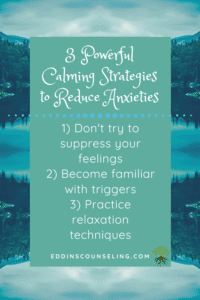June 22, 2020
Anxiousness Won’t Go Away? 3 Powerfully Calming Strategies
Written by Rachel Eddins
Posted in Anxiety and with tags: grounding, self soothing, stress management
 Anxiety is not always straightforward. You may, for a while, even ignore the symptoms or deny that they need your full attention. Persistent anxiety can also tell you unproductive stories.
Anxiety is not always straightforward. You may, for a while, even ignore the symptoms or deny that they need your full attention. Persistent anxiety can also tell you unproductive stories.
For example, your internal monologue may spin your thoughts and behaviors as logical and necessary. It can’t be dysfunctional if it’s keeping you safe, right?
In truth, you can live in an anxious state for months or years without recognizing it. This tricky cycle can make it quite difficult to make your anxiousness go away. You may even start to think that your anxiety is a character trait.
Fortunately, there are calming strategies you can take to soothe and calm yourself. To make internal peace, you’ll need awareness, self-help strategies, and guidance from a skilled professional.
How Anxiety Works
When we think of anxiety, lots of words may come to mind. For example, fear, nervousness, panic, stress, and worry are common synonyms. All of these are normal emotions in any person’s life. On their own, they don’t signal the presence of an anxiety disorder. Even occasional anxiety is not a symptom.
Anxiety is natural, it puts us on alert appropriately when it comes to survival. The brain senses potential danger and warns the entire body via noticeable signs and symptoms.
An anxiety disorder is diagnosed by a health professional. It occurs when the natural anxiety process goes awry. The simplest way to picture this is to imagine a warning system that never completely turns off. Anxiety disorders are the most common mental illness — impacting more than 18 percent of the U.S. population.
Dealing with this anxiety begins with taking personal steps to accept, acknowledge, and address your anxiousness.
3 Powerful Calming Strategies
1. Don’t Try to Suppress It
Accepting the presence of anxiety takes away some of its power. There is no shame in your struggle with a very common and puzzling condition. By not avoiding or suppressing the feelings, you are better suited to understand them and manage them.
2. Become Familiar With Triggers and Early Signs
Anxiety keeps you in a state of hyper-vigilance. Your brain sense danger where it does not exist. But this process is not invisible. By keeping track of your patterns (a journal is super helpful), you can pinpoint events, people, and situations that trigger your anxious brain. When that is not possible, you can still identify the physical and emotional symptoms that signal a looming anxiety attack.
This awareness is a powerful strategy for minimizing the frequency and intensity of anxiety episodes in your life.
3. Practice Relaxation Techniques
You’ve accepted the presence of your anxiety attacks. Next, you learned what to look out for and how to sense their looming arrival. But what can you do when the anxiousness is already upon you?
Cultivate ways to self-soothe and shorten the duration of the episode. Common relaxation techniques include:
- Breathing exercises: Any variations of inhales and exhales that work for you.
- Movement: Your mind and body typically respond positively to movement. If the situation allows for it, get yourself moving. If not, when possible, engage in gentle activities like yoga, tai chi, and stretching.
- Meditation: If you can stop and take a few minutes, this is an ideal form of stress management.
- Mindfulness: When anxiety hits and you can’t readily meditate, do whatever feels right to bring yourself into the present moment.
Learn Calming Strategies with an Anxiety Specialist
 As mentioned up top, there is a third component to addressing your anxiousness (especially when it’s been around for a while):
As mentioned up top, there is a third component to addressing your anxiousness (especially when it’s been around for a while):
Ask for help.
One good thing about the prevalence of anxiety disorders is that many treatment approaches have been developed. Talk to a therapist to learn more about what steps you can take. Your regularly scheduled counseling sessions will act as a laboratory. Together, you’ll explore, analyze, and uncover much about yourself. Dysfunctional behaviors will be recognized and discarded. With support and commitment, you can and will replace unproductive anxiety with powerful new strategies to reclaim control over your emotions and your life.
With anxiety counseling, your therapist can help you with calming strategies to help with anxious thoughts and emotions. Contact us to find out how to get started soon. You can also call to schedule an online appointment at 832-559-2622 or book an appointment online.
5 Ways to Reduce Anxiety
Get instant access to your free ebook.
Grounding & Self Soothing
Get instant access to your free ebook.
Create Healthier Thoughts & Feelings
Get instant access to your free ebook.
Why You Feel This Way
Get instant access to your free ebook.
















